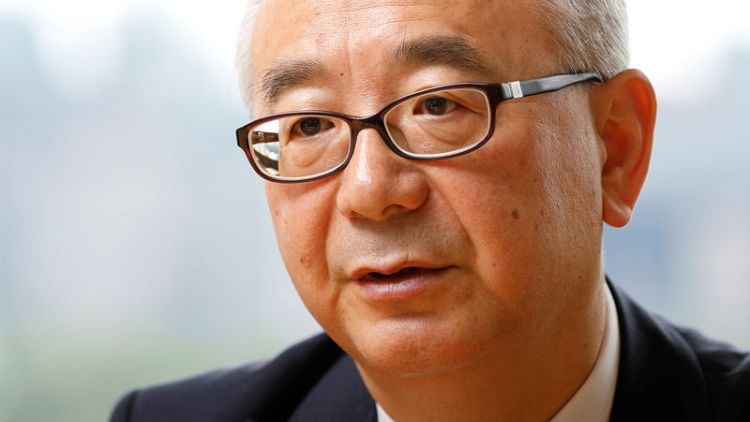By Takashi Umekawa
TOKYO (Reuters) - For much of its 141-year history, Japan's Shionogi & Co Ltd <4507.T> has played safe when selling its drugs in the United States and other overseas markets - relying on bigger partners to promote its products and avoiding the cost of maintaining a large sales force.
It followed that pattern for blockbuster cholesterol treatment Crestor, its biggest success story, which was developed in-house until mid-stage trials when it teamed up with AstraZeneca Plc <AZN.L>. AstraZeneca gained the rights to sell the drug in all markets but Japan.
But Shionogi, Japan's most profitable drugmaker by operating margin, has become open to more risk - prodded into seizing more sales for itself by a looming patent cliff that will see a key HIV drug and three combination medicines exposed to generic competition in nine years time.
"We'll have to increase by a bit the portion of what we sell by ourselves and not just rely on others," CEO Isao Teshirogi told Reuters in an interview.
Shionogi tested the waters in the world's biggest drug market last year with Mulpleta, a drug designed to prevent excessive bleeding in patients who need surgery and have a lower blood platelet count due to chronic liver disease.
It also plans to develop its own U.S. sales team for cefiderocol, an antibiotic it hopes will gain approval this year and which will be used as a last-resort treatment for patients with infectious disease not cured by other antibiotics.
"Cefiderocol is a drug that will only be used by specialists at big hospitals and across the U.S., we're only going to need 50 to 70 medical representatives. That makes it a good next entry point for us - something we can do under own steam," he said.
Shionogi declined to disclose its sales team numbers for Mulpleta, a drug it expects will earn $12.3 million this year. It has also not disclosed sales estimates for cefiderocol.
Japan's No. 9 drugmaker by revenue is, however, also keen not to bite off more than it can chew.
Teshirogi said while it might be possible to take on U.S. sales of a drug like an HIV medicine with a team of 100-plus, primary care market drugs that require teams of 400 to 500 people were another matter.
An attempt at U.S. sales in 2013 for Osphena, used by women who experience pain during sexual intercourse, became too costly, as it was a primary care market drug and as it was the only drug Shionogi had in women's healthcare at the time. It licensed out Osphena to Canada's Duchesnay in 2017.
Shionogi, which gains roughly half its revenue from royalties, has notched up four straight years of record operating profit and boasts an operating profit margin of 38%. It also has promising drugs like newly launched flu-drug Xofluza but the patent cliff for its HIV treatments will create an earnings gap that will be hard to completely offset.
HIV drug Tivicay and three combination treatments, which are marketed by GlaxoSmithKline's <GSK.L> ViiV Healthcare Ltd, accounted for a third of Shionogi's 364 billion yen ($3.4 billion) in revenue in the last financial year.
"The next few years are going to be key for Shionogi," said Citigroup analyst Hidemaru Yamaguchi.
The drugmaker currently has 23 drugs in clinical trials with five of those trials having progressed to late-stage.
In other moves to diversify its revenue stream, Shionogi has partnered with U.S. startup Akili Interactive Labs Inc to develop and sell two medical apps, one for ADHD and one for patients on the autism spectrum.
Japan has yet to approve apps designed to treat diseases or disorders. By comparison, the U.S. Food and Drug Administration gave its first nod for such medical apps in 2010.
Teshirogi said Shionogi was keen to develop drugs made from so-called mid-sized molecules such as peptides - an area that few other drugmakers were looking at. Shionogi is working with universities and had partnered with Japanese biopharmaceutical firm PeptiDream Inc <4587.T> to conduct joint research.
"I truly believe we're going to see two or three products come out of these efforts that will help us counter our HIV patent cliff," he said.
(GRAPHIC: Japan's top 10 drugmakers by sales and operating profit margin - https://tmsnrt.rs/2FvJLGx)
(Reporting by Takashi Umekawa; Editing by David Dolan and Edwina Gibbs)



